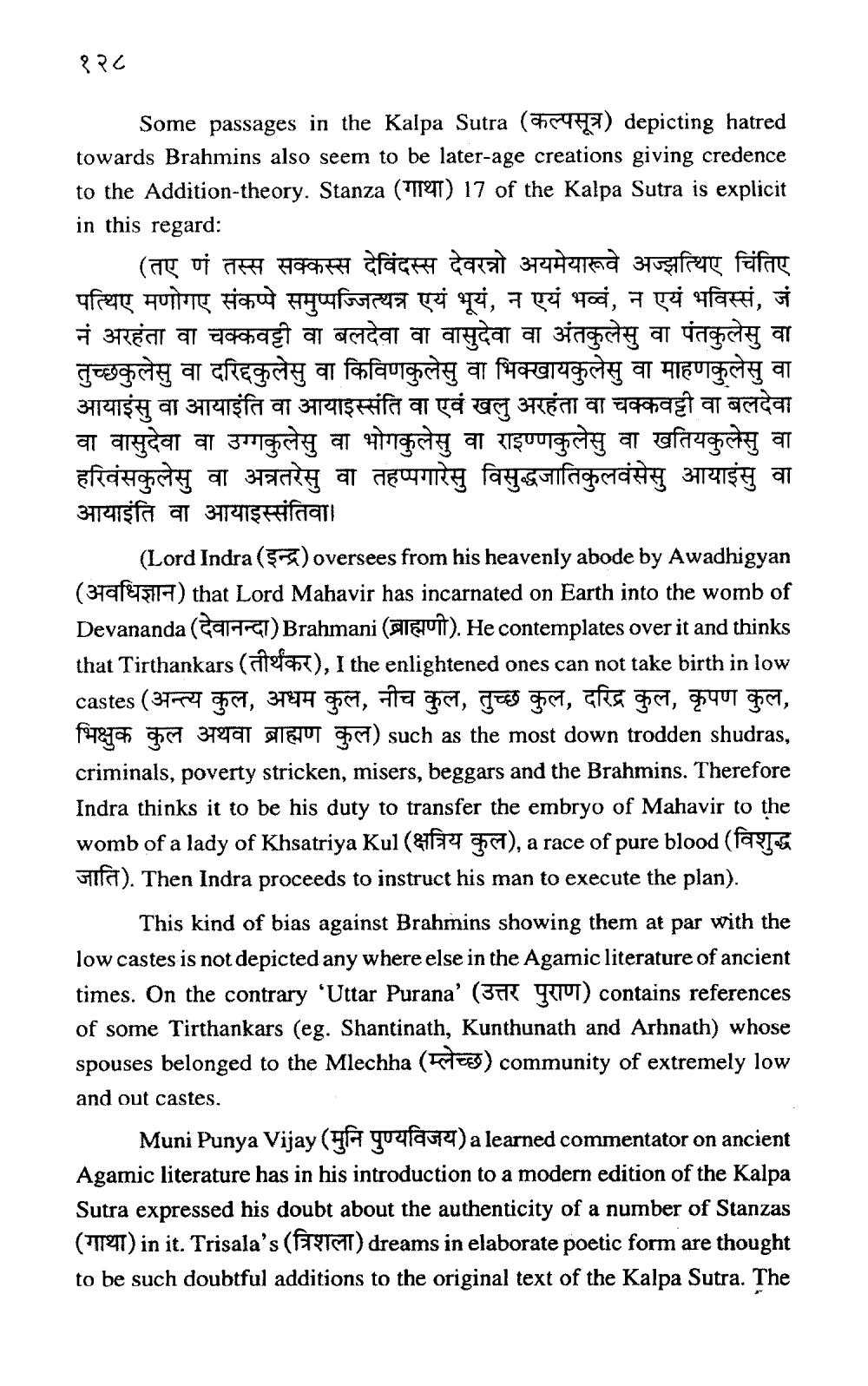________________
१२८
Some passages in the Kalpa Sutra (0264 ) depicting hatred towards Brahmins also seem to be later-age creations giving credence to the Addition-theory. Stanza (गाथा) 17 of the Kalpa Sutra is explicit in this regard:
(तए णं तस्स सक्कस्स देविंदस्स देवरन्नो अयमेयारूवे अज्झथिए चिंतिए पत्थिए मणोगए संकप्पे समुप्पज्जित्थन एयं भूयं, न एयं भव्वं, न एयं भविस्सं, जं नं अरहंता वा चक्कवट्टी वा बलदेवा वा वासुदेवा वा अंतकुलेसु वा पंतकुलेसु वा तुच्छकुलेसु वा दरिद्दकुलेसु वा किविणकुलेसु वा भिक्खायकुलेसु वा माहणकुलेसु वा आयाइंसु वा आयाइंति वा आयाइस्संति वा एवं खलु अरहंता वा चक्कवट्टी वा बलदेवा वा वासुदेवा वा उग्गकुलेसु वा भोगकुलेसु वा राइण्णकुलेसु वा खतियकुलेसु वा हरिवंसकुलेसु वा अनतरेसु वा तहप्पगारेसु विसुद्धजातिकुलवंसेसु आयाइंसु वा आयाइंति वा आयाइस्संतिवा।
(Lord Indra (5-5) oversees from his heavenly abode by Awadhigyan (अवधिज्ञान) that Lord Mahavir has incarnated on Earth into the womb of Devananda (देवानन्दा)Brahmani (ब्राह्मणी). He contemplates over it and thinks that Tirthankars (aitefat), I the enlightened ones can not take birth in low castes (अन्त्य कुल, अधम कुल, नीच कुल, तुच्छ कुल, दरिद्र कुल, कृपण कुल, भिक्षुक कुल अथवा ब्राह्मण कुल) such as the most down trodden shudras, criminals, poverty stricken, misers, beggars and the Brahmins. Therefore Indra thinks it to be his duty to transfer the embryo of Mahavir to the womb of a lady of Khsatriya Kul (क्षत्रिय कुल), a race of pure blood (विशुद्ध जाति). Then Indra proceeds to instruct his man to execute the plan).
This kind of bias against Brahmins showing them at par with the low castes is not depicted any where else in the Agamic literature of ancient times. On the contrary 'Uttar Purana' (उत्तर पुराण) contains references of some Tirthankars (eg. Shantinath, Kunthunath and Arhnath) whose spouses belonged to the Mlechha (1083) community of extremely low and out castes.
Muni Punya Vijay(मुनि पुण्यविजय)alearned commentator on ancient Agamic literature has in his introduction to a modern edition of the Kalpa Sutra expressed his doubt about the authenticity of a number of Stanzas (गाथा) in it. Trisala's (त्रिशला) dreams in elaborate poetic form are thought to be such doubtful additions to the original text of the Kalpa Sutra. The




